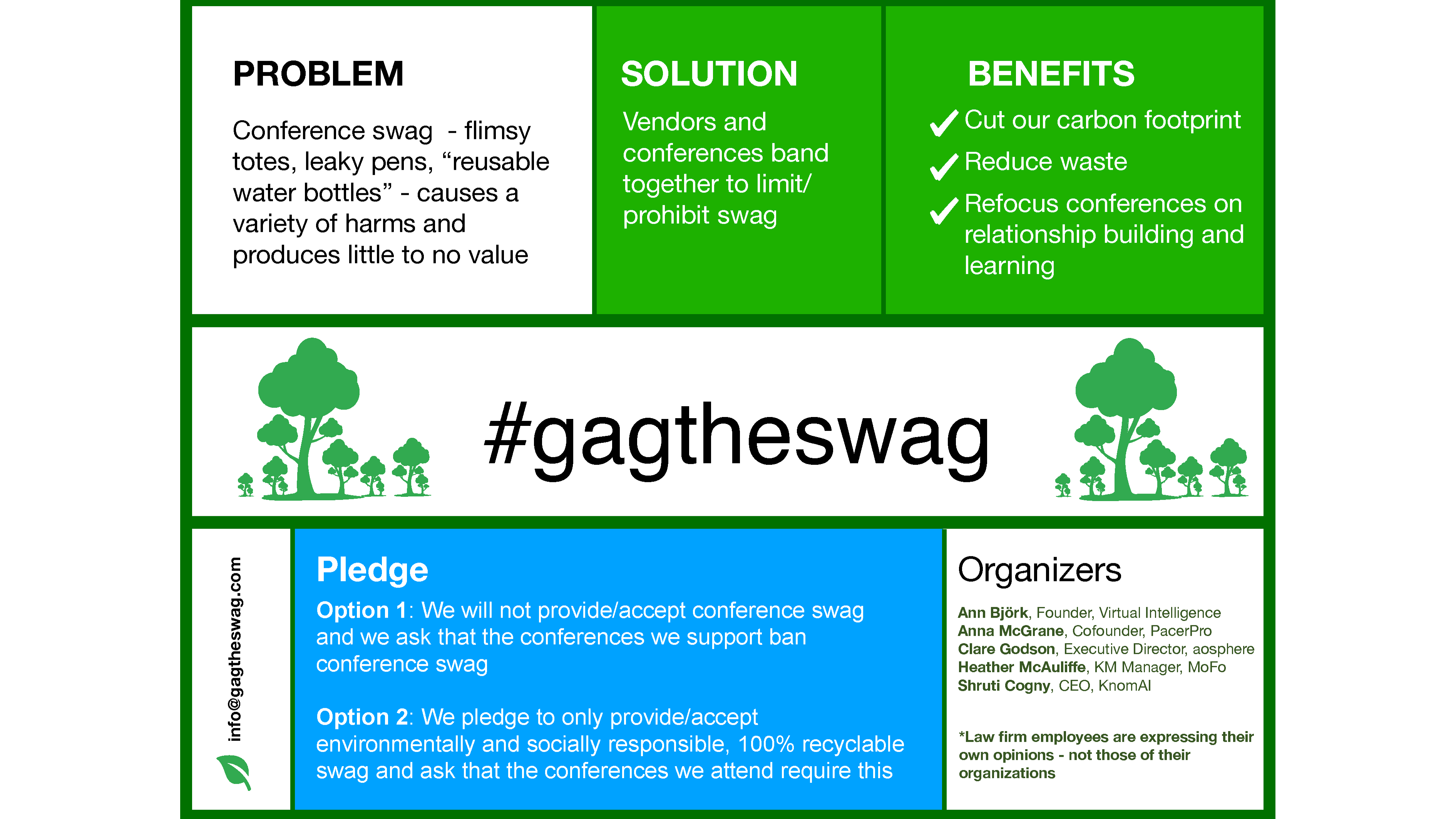You may have heard about #gagtheswag, the campaign to limit or prohibit all that cheap swag given away at legal conferences.
The idea is to encourage vendors and conference organizers to either ban conference swag or provide only swag that is 100 percent recyclable.
Frank Ready reported on the campaign Friday at Legaltech News and Richard Tromans posted about it at Artificial Lawyer. The Time Blawg takes a dissenting view.
The five organizers of the campaign — Ann Björk, cofounder, Virtual Intelligence VQ; Shruti Ahuja-Cogny, CEO, KnomAI; Clare Godson, executive director, aosphere; Heather McAuliffe, knowledge management manager, Morrison & Foerster; and Anna McGrane, cofounder, PacerPro — focus on the environmental impact of all that swag.
They have a point. All those plastic do-dads and knick-knacks have no useful purpose and generally end up in landfills somewhere. Those cheap t-shirts and tote bags have environmental impacts also, including water pollution, the use of toxic chemicals and textile waste.
But there is another side to this that the #gagtheswag organizers have omitted from their campaign and other commentators have failed to mention. While the environmental issues are important, equally important is the fact that swag is almost entirely manufactured using subsistence-wage workers who toil in often-unsafe conditions with few if any job protections.
There is cruel irony in the fact that the stress-relief squishy ball you picked up at your last conference was manufactured by workers who toil in the most stressful of conditions. As a recent Fast Company article said, these workers often labor under inhumane conditions where many have died because of a lack of safety standards.
Most of these promotional products come from China, where factory workers overall earn less than a tenth of their U.S. counterparts and are more than three times more likely to be killed at work. In Bangladesh, where many cheap clothing items are made, factory fires killed at least 500 garment workers over a six-year span and the toll of those injured rises to the thousands.
What’s the point of this swag, anyway? Has anyone ever bought a vendor’s product because it gave away a cheap pen? Does anyone who took that pen ever later think, “Nice pen, I think I’ll buy this company’s software”?
If all vendors want to do is get traffic to their booths, I can think of plenty of ways they can do that without contributing to pollution and worker exploitation. Offer neck massages, as I’ve seen vendors sometimes do. Support the local economy by giving away some local food item or samples of a local craft beer.
Or — perish the thought — try to lure people to your booth based on the merits of your product.
What the #gagtheswag organizers ask is that vendors and conferences take a pledge. They offer two options:
- Option 1: We will not provide/accept conference swag and we ask that the conferences we support ban conference swag.
- Option 2: We pledge to only provide/accept environmentally and socially responsible, 100 percent recyclable swag and ask that the conferences we attend require this.
I’m no economist or environmentalist, but I suspect that the measurable impact of banning swag at legal conferences would be minimal in the scheme of things. Swag would still proliferate elsewhere and factories would still exploit cheap labor to produce cheap products.
But the legal industry should stand up for principles. Collectively, we should strive to reduce waste and reduce worker exploitation. Even if the impact of #gagtheswag would be largely symbolic, it is a statement the legal industry should endorse.
 Robert Ambrogi Blog
Robert Ambrogi Blog